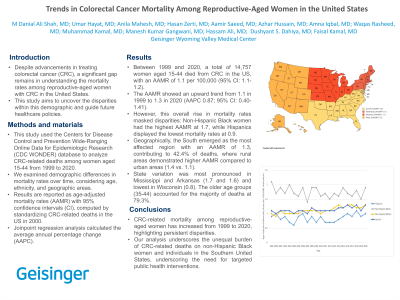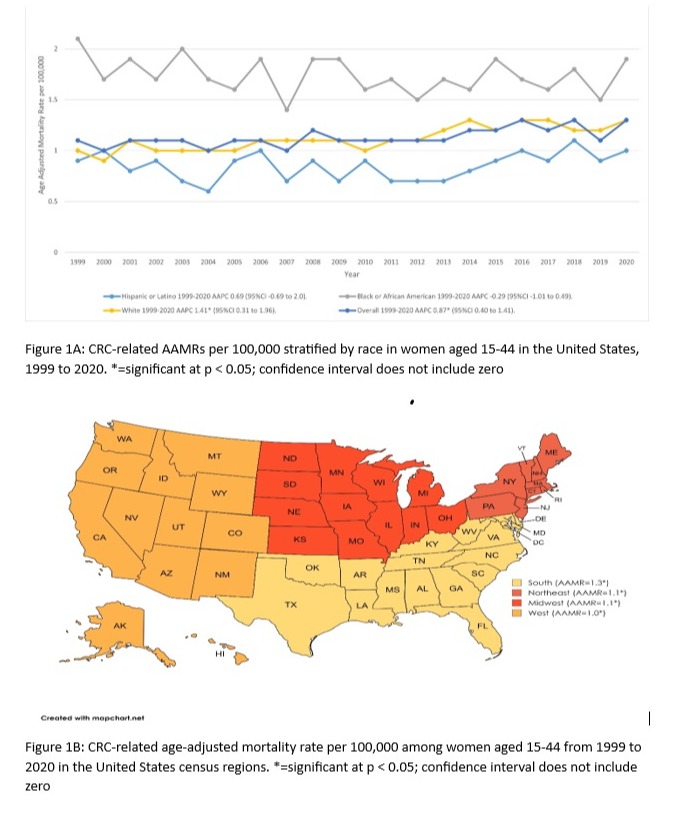Monday Poster Session
Category: Colorectal Cancer Prevention
P2103 - About Her: Trends in Colorectal Cancer Mortality Among Reproductive-Aged Women in the United States
Monday, October 28, 2024
10:30 AM - 4:00 PM ET
Location: Exhibit Hall E

Has Audio
- MS
M Danial Ali Shah, MD
King Edward Medical University
Lahore, Punjab, Pakistan
Presenting Author(s)
M Danial Ali Shah, MD1, Umar Hayat, MD2, Anila Mahesh, MD2, Hasan Zerti, MD2, Aamir Saeed, MD3, Azhar Hussain, MBBS4, Amna Iqbal, MD5, Waqas Rasheed, MD6, Muhammad Kamal, MD7, Manesh Kumar Gangwani, MD8, Hassam Ali, MD9, Dushyant S. Dahiya, MD10, Faisal Kamal, MD11
1King Edward Medical University, Lahore, Punjab, Pakistan; 2Geisinger Wyoming Valley Medical Center, Wilkes-Barre, PA; 3Vanderbilt University Medical Center, Nashville, TN; 4SUNY Upstate Medical University, Syracuse, NY; 5University of Toledo Medical Center, Toledo, OH; 6University of Kentucky, Lexington, KY; 7Hackensack Meridian Health, Roselle Park, NJ; 8University of Toledo, Toledo, OH; 9ECU Health Medical Center, Greenville, NC; 10The University of Kansas School of Medicine, Kansas City, KS; 11Sidney Kimmel Medical College at Thomas Jefferson University, Philadelphia, PA
Introduction: Despite advancements in treating colorectal cancer (CRC), a significant gap remains in understanding the mortality rates among reproductive-aged women with CRC in the United States. This study aims to uncover the disparities within this specific group and guide future healthcare policies.
Methods: This study used the Centers for Disease Control and Prevention Wide-Ranging Online Data for Epidemiologic Research (CDC WONDER) database to analyze CRC-related deaths among women aged 15-44 from 1999 to 2020. We examined demographic differences in mortality rates over time, considering age, ethnicity, and geographic areas. Results are reported as age-adjusted mortality rates (AAMR) with 95% confidence intervals (CI), computed by standardizing CRC-related deaths in the US in 2000. Joinpoint regression analysis calculated the average annual percentage change (AAPC).
Results: Between 1999 and 2020, a total of 14,757 women aged 15-44 died from CRC in the US, with an AAMR of 1.1 per 100,000 (95% CI: 1.1-1.2). The AAMR showed an upward trend from 1.1 in 1999 to 1.3 in 2020 (AAPC 0.87; 95% CI: 0.40-1.41). However, this overall rise in mortality rates masked disparities: Non-Hispanic Black women had the highest AAMR at 1.7, while Hispanics displayed the lowest mortality rates at 0.9. Geographically, the South emerged as the most affected region with an AAMR of 1.3, contributing to 42.4% of deaths, where rural areas demonstrated higher AAMR compared to urban areas (1.4 vs. 1.1). State variation was most pronounced in Mississippi and Arkansas (1.7 and 1.6) and lowest in Wisconsin (0.8). The mortality rate was higher among the older age group (35-44), accounting for 79.3%.
Discussion: CRC-related mortality among reproductive-aged women has increased from 1999 to 2020, highlighting persistent disparities. Our analysis underscores the unequal burden of CRC-related deaths on non-Hispanic Black women and individuals in the Southern United States, underscoring the need for targeted public health interventions.

Disclosures:
M Danial Ali Shah, MD1, Umar Hayat, MD2, Anila Mahesh, MD2, Hasan Zerti, MD2, Aamir Saeed, MD3, Azhar Hussain, MBBS4, Amna Iqbal, MD5, Waqas Rasheed, MD6, Muhammad Kamal, MD7, Manesh Kumar Gangwani, MD8, Hassam Ali, MD9, Dushyant S. Dahiya, MD10, Faisal Kamal, MD11. P2103 - About Her: Trends in Colorectal Cancer Mortality Among Reproductive-Aged Women in the United States, ACG 2024 Annual Scientific Meeting Abstracts. Philadelphia, PA: American College of Gastroenterology.
1King Edward Medical University, Lahore, Punjab, Pakistan; 2Geisinger Wyoming Valley Medical Center, Wilkes-Barre, PA; 3Vanderbilt University Medical Center, Nashville, TN; 4SUNY Upstate Medical University, Syracuse, NY; 5University of Toledo Medical Center, Toledo, OH; 6University of Kentucky, Lexington, KY; 7Hackensack Meridian Health, Roselle Park, NJ; 8University of Toledo, Toledo, OH; 9ECU Health Medical Center, Greenville, NC; 10The University of Kansas School of Medicine, Kansas City, KS; 11Sidney Kimmel Medical College at Thomas Jefferson University, Philadelphia, PA
Introduction: Despite advancements in treating colorectal cancer (CRC), a significant gap remains in understanding the mortality rates among reproductive-aged women with CRC in the United States. This study aims to uncover the disparities within this specific group and guide future healthcare policies.
Methods: This study used the Centers for Disease Control and Prevention Wide-Ranging Online Data for Epidemiologic Research (CDC WONDER) database to analyze CRC-related deaths among women aged 15-44 from 1999 to 2020. We examined demographic differences in mortality rates over time, considering age, ethnicity, and geographic areas. Results are reported as age-adjusted mortality rates (AAMR) with 95% confidence intervals (CI), computed by standardizing CRC-related deaths in the US in 2000. Joinpoint regression analysis calculated the average annual percentage change (AAPC).
Results: Between 1999 and 2020, a total of 14,757 women aged 15-44 died from CRC in the US, with an AAMR of 1.1 per 100,000 (95% CI: 1.1-1.2). The AAMR showed an upward trend from 1.1 in 1999 to 1.3 in 2020 (AAPC 0.87; 95% CI: 0.40-1.41). However, this overall rise in mortality rates masked disparities: Non-Hispanic Black women had the highest AAMR at 1.7, while Hispanics displayed the lowest mortality rates at 0.9. Geographically, the South emerged as the most affected region with an AAMR of 1.3, contributing to 42.4% of deaths, where rural areas demonstrated higher AAMR compared to urban areas (1.4 vs. 1.1). State variation was most pronounced in Mississippi and Arkansas (1.7 and 1.6) and lowest in Wisconsin (0.8). The mortality rate was higher among the older age group (35-44), accounting for 79.3%.
Discussion: CRC-related mortality among reproductive-aged women has increased from 1999 to 2020, highlighting persistent disparities. Our analysis underscores the unequal burden of CRC-related deaths on non-Hispanic Black women and individuals in the Southern United States, underscoring the need for targeted public health interventions.

Figure: Figure 1A: CRC-related AAMRs per 100,000 stratified by race in women aged 15-44 in the United States, 1999 to 2020. *=significant at p < 0.05; confidence interval does not include zero
Figure 1B: CRC-related age-adjusted mortality rate per 100,000 among women aged 15-44 from 1999 to 2020 in the United States census regions. *=significant at p < 0.05; confidence interval does not include zero
Figure 1B: CRC-related age-adjusted mortality rate per 100,000 among women aged 15-44 from 1999 to 2020 in the United States census regions. *=significant at p < 0.05; confidence interval does not include zero
Disclosures:
M Danial Ali Shah indicated no relevant financial relationships.
Umar Hayat indicated no relevant financial relationships.
Anila Mahesh indicated no relevant financial relationships.
Hasan Zerti indicated no relevant financial relationships.
Aamir Saeed indicated no relevant financial relationships.
Azhar Hussain indicated no relevant financial relationships.
Amna Iqbal indicated no relevant financial relationships.
Waqas Rasheed indicated no relevant financial relationships.
Muhammad Kamal indicated no relevant financial relationships.
Manesh Kumar Gangwani indicated no relevant financial relationships.
Hassam Ali indicated no relevant financial relationships.
Dushyant Dahiya indicated no relevant financial relationships.
Faisal Kamal indicated no relevant financial relationships.
M Danial Ali Shah, MD1, Umar Hayat, MD2, Anila Mahesh, MD2, Hasan Zerti, MD2, Aamir Saeed, MD3, Azhar Hussain, MBBS4, Amna Iqbal, MD5, Waqas Rasheed, MD6, Muhammad Kamal, MD7, Manesh Kumar Gangwani, MD8, Hassam Ali, MD9, Dushyant S. Dahiya, MD10, Faisal Kamal, MD11. P2103 - About Her: Trends in Colorectal Cancer Mortality Among Reproductive-Aged Women in the United States, ACG 2024 Annual Scientific Meeting Abstracts. Philadelphia, PA: American College of Gastroenterology.
